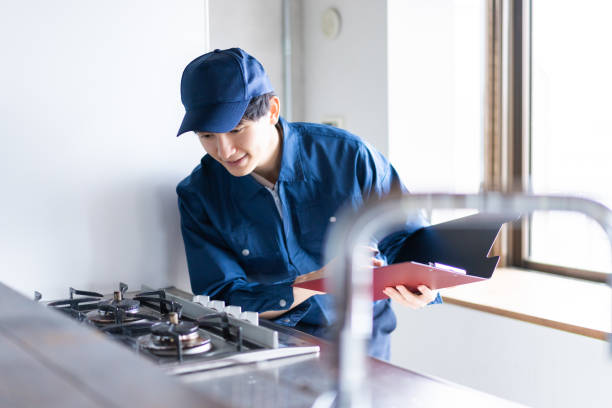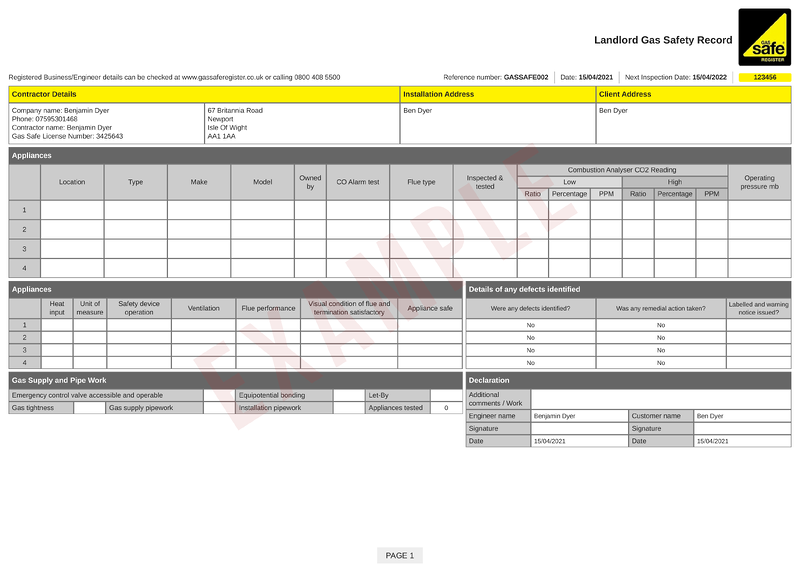
What is a Gas Safety Certificate?
The Gas Safety Certificate, also known as the CP12 certificate, is a vital document for any landlord or tenant in the UK. It is a legal requirement to have a gas safety check completed on all gas appliances and fittings in rental properties every 12 months by a Gas Safe registered engineer.
The certificate verifies that the appliances and fittings have been checked and are safe to use. It is important to understand the purpose of the Gas Safety Certificate and the role it plays in ensuring gas safety in your home or business.
A Gas Safety Certificate is a document issued by a Gas Safe registered engineer after completing a gas safety check on a property. The certificate confirms that all gas appliances and fittings in the property have been checked and are safe to use. The check includes inspections of gas boilers, cookers, fires, and any other gas appliances in the property.
The engineer will also test the flues, pipes, and other gas fittings to ensure that they are in good working order and do not pose a risk of carbon monoxide (CO) leakage.
Who Needs a Gas Certificate?
If you own or manage rental accommodation with gas appliances, you are legally required to have an annual gas safety inspection and certificate. This ensures gas appliances are safely installed and maintained. Not having an up-to-date certificate can lead to fines of up to £6,000 from your local council. It also protects your tenants and avoids any dangerous CO emissions.
A landlord in the UK is required by law to have a gas safety check completed on their property every 12 months. This includes homes, apartments, and businesses. It is important to note that only a Gas Safe registered engineer can carry out a gas safety check and issue a Gas Safety Certificate. It is illegal for anyone who is not registered with Gas Safe to perform gas work in the UK.
Gas certificate requirements
Gas appliances and fittings can pose a serious risk if they are not properly maintained and checked regularly. Gas leaks, faulty appliances, and poor ventilation can all lead to the build-up of CO in a property, which can be deadly. The Gas Safety Certificate is an important tool in ensuring that gas appliances and fittings are safe to use and do not pose a risk of CO leakage.
In addition to the legal requirement for a Gas Safety Certificate, it is also important to consider the safety of those living or working in the property. A gas safety check can identify potential issues before they become a serious problem, helping to prevent accidents and injuries caused by faulty gas appliances or fittings.
How can I get a gas safety certificate?
Contact Gas Safe registered engineers in your area to perform the inspection and issue a certificate. The engineer will check all gas appliances for safety and provide a CP12 certificate valid for one year. Make sure to renew the inspection annually. Some landlords include the cost in rental agreements.
What Happens During a Gas Safety Check?
During a gas safety check, the Gas Safe registered engineer will inspect all gas appliances and fittings in the property. This includes checking the appliances for any visible defects, testing the flues and pipes for any leaks, and checking the ventilation to ensure it is sufficient. The engineer will also test the appliances to ensure that they are operating efficiently and safely.
If any issues are identified during the check, the engineer will provide a report detailing the necessary repairs or replacements. The engineer may also provide advice on how to maintain the appliances and fittings to ensure they remain safe to use.

How to Get the certificate
To get a Gas Safety Certificate, you will need to contact a Gas Safe registered engineer to schedule a gas safety check. It is important to ensure that the engineer you use is registered with Gas Safe, as only registered engineers are legally allowed to carry out gas work in the UK.
You can find a Gas Safe registered engineer in your area by visiting the Gas Safe website or by calling the Gas Safe Register helpline. It is recommended to get multiple quotes from different engineers to ensure you are getting the best price.
Gas Safety Certificate: A tenant’s perspective
As a tenant, it is important to be aware of the Gas Safety Certificate and to ensure that your landlord is in compliance with the law. By law, landlords are required to have a gas safety check completed on their property every 12 months by a Gas Safe registered engineer, and to provide a copy of the Gas Safety Certificate to their tenants.
If your landlord does not have a Gas Safety Certificate or has not had a gas safety check completed, it is important to bring this to their attention as soon as possible. You can request a copy of the Gas Safety Certificate from your landlord or ask them to schedule a gas safety check.
If your landlord does not respond to your request or refuses to have a gas safety check completed, you can report them to the Health and Safety Executive (HSE) or your local council. The HSE and local council have the authority to take legal action against landlords who do not comply with the gas safety regulations.
As a tenant, you have the right to live in a safe and secure property. If you have concerns about the gas safety of your home, it is important to speak up and take action to ensure that any issues are addressed. In the meantime, you can also take steps to protect yourself and your family by installing a carbon monoxide detector and familiarising yourself with the symptoms of CO poisoning.

What is the difference between a gas safety certificate and gas safety record?
A Gas Safety Record is a record of any gas work carried out on a property. It includes details of the appliances and fittings, as well as any issues that were identified and any repairs or replacements that were carried out.
The Gas Safety Record is kept by the landlord or property owner and is used to keep track of the maintenance and safety of the gas appliances and fittings in the property.
It is important for both landlords and tenants to be aware of the Gas Safety Certificate and Gas Safety Record, as they both play an important role in ensuring the safety of gas appliances and fittings in a property.
Gas Safety Certificate Cost
The cost of a Gas Safety Certificate is around £80 for one boiler, a cooker and a gas fire and can vary depending how many gas appliances are in the property that need to be checked. The certificate is valid for one year, after which you’ll need to renew it. Factors like the number of gas appliances and location complexity affect the cost.
There are a few cases where you may be able to get a gas safety check and certificate for free:
- If you receive certain benefits, such as Pension Credit or Universal Credit, you may be eligible for a free gas safety check through the Home Energy Saving Scheme.
- Some energy suppliers offer free gas safety checks to their customers as part of their social responsibility initiatives. You can check with your energy supplier to see if they offer this service.
- Some local councils and housing associations may offer free gas safety checks to their tenants. You can contact your local council or housing association to see if they offer this service.
It is important to note that while the gas safety check may be free, you may still need to pay for any repairs or replacements that are recommended by the engineer.
In general, it is a good idea to shop around and get multiple quotes from different engineers to ensure that you are getting the best price for a gas safety check and certificate. You can find a Gas Safe registered engineer in your area by visiting the Gas Safe website or by calling the Gas Safe Register helpline.
What if you own a gas appliance in a rented property?
If you own a gas appliance in a rented property, you are responsible for the maintenance and safety of the appliance. The landlord is not responsible for that appliance and does not need to carry out a safety check on it or provide a certificate. Should a gas incident occur in the property, you can provide proof that your appliance was not faulty.
If you decide to do the safety check yourself, it is important to keep a copy of the Gas Safety Certificate in a safe place, as you may need to provide it to the landlord or to a new tenant if you move out of the property.
Read related articles:
*The information in this article should be used for general guidance only and not as financial or health advice. Full details are on the link in the footer to our disclaimer page. Always discuss your requirements with a competent and suitably qualified professional before undertaking any work.
